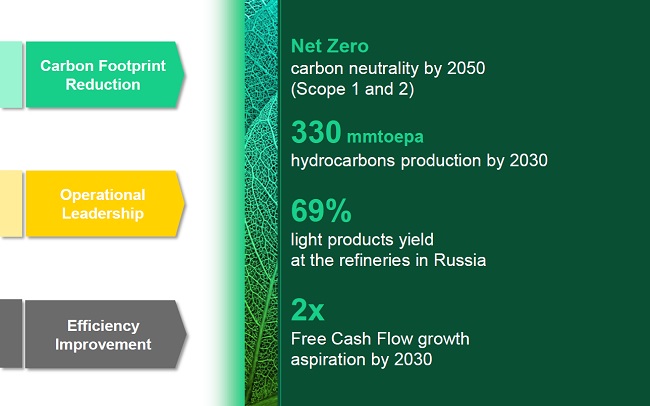Please activate JavaScript in your browser to use all interface options.
Rosneft-2030 Strategy
“Rosneft-2030: Reliable Energy and Global Energy Transition” Strategy has been approved by the Board of Directors at the end of 2021.
Key priorities of the new Strategy are carbon footprint reduction, operational leadership and efficiency improvement. Strategy implementation will support achievement of 17 UN Sustainable Development Goals, as well as the goals of ”2050 Russian Federation Strategy of Social and Economic Development with Low Greenhouse Gas Emission” and the Paris Agreement.

To ensure successful Strategy implementation targets are aligned with management KPIs and remuneration system.
“Rosneft-2030” – climate priorities horizons1:
- Short-term: 5% reduction in absolute greenhouse gases emissions (Scope 1 and 2) by 2025.
- Mid-term:
- More than 25% absolute GHG emissions (Scope 1 and 2) reduction by 2035;
- Methane intensity reduction to less than 0.2% by 2030;
- Zero routine flaring of associated petroleum gas by 20302;
- Less than 20 kg СО2-e/boe intensity of Upstream GHG emissions (Scope 1 and 2) by 2030 or earlier;
- Long-term: carbon neutrality (Scope 1 and 2) by 2050.
These activities are built on Carbon Management 2035 Plan and will contribute to acceleration of decarbonization initiatives.
Carbon neutrality is the basis for shaping Rosneft's strategic vision: to remain a reliable producer while minimizing the impact on the climate and the environment. Implementation will be facilitated through a number of actions aimed at emissions reduction, including use of low-carbon power generation, energy-saving technologies, carbon capture and storage technologies, natural sinks potential and other.
“Rosneft-2030” Strategy sets priorities in all the business segments:
- Keeping the leadership in lifting costs with hydrocarbon production of 330 million toe;
- Growth of gas share in total hydrocarbon production to 25%;
- Growth of light product yields in Russia to 69% through existing programs;
- Implementation of circular economy model;
- Implementation of biodiversity conservation programs (“Net positive Biodiversity impact” according to the best practice of International Union for Conservation of Nature (IUCN));
- Remediation of 100% of the legacy contaminated land areas and waste;
- Aspiration for zero Fatal Accident Rate (FAR, including external contractors) and zero Process Safety Events Rate (PSER-1);
- Continuation of corporate and social programs implementation, ensuring development of human resources and contribution to implementation of the National Priorities of Russia;
- Shareholder payouts increase and profitability growth;
- 2x FCF growth aspiration by 2030.
Please see Corporate annual reports for more detailed information on the Strategy implementation, key milestones and results.
1 Mitigation targets are set from the 2020 baseline and cover 100% of Scope 1 and 2 emissions in the Company's reporting perimeter, unless otherwise noted.
2 The goal is in line with the World Bank's Zero Routine Flaring of Associated Petroleum Gas by 2030 initiative.

-315xx70.png)